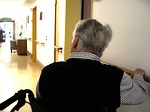A new report shows a possible connection between traumatic brain injuries and dementia. According to an article by US News and World Report, veterans who have suffered a traumatic brain injury are more likely to develop dementia later in life.
The study reports that former soldiers are 60 times more likely to develop dementia earlier in life than their counterparts who have never been diagnosed with any brain injury.
The study examined 190,000 veterans, who were all around 68-years-old and dementia-free. According to the report, 1,299 of these vets had at some point received a traumatic brain injury diagnosis.
 The study followed the vets over the course of nine years. During that time, researchers observed that 16 percent of the veterans with brain injuries developed dementia, while only 10 percent of those without a brain injury developed dementia.
The study followed the vets over the course of nine years. During that time, researchers observed that 16 percent of the veterans with brain injuries developed dementia, while only 10 percent of those without a brain injury developed dementia.
While the study does indicate a strong link between TBIs and dementia, there are numerous other factors that could influence the equation, including the possible presence of high blood pressure, post-traumatic stress disorder, depression and diabetes.
The author of the study was quoted as saying, “Our results suggest that [brain injury] may increase the risk of developing dementia in older veterans, with an age of onset about two years earlier. So clinicians may want to keep an eye out for signs of cognitive impairment in older veterans with a history of [brain injury].”
Dementia is a term that covers a range of medical symptoms, such as extreme memory loss and the lack of ability to accomplish basic daily care responsibilities. There are many different types of dementia conditions, including:
Alzheimer’s Disease. This is reportedly the most common type of dementia, accounting for about 70 percent of cases. Early warning signs of this disease include memory problems, excessive lethargy and depression.
Vascular Dementia. This disorder is also known as post-stroke dementia because it
usually occurs in patients that have recently suffered a stroke. This disease generally arises from blood vessel blockage in the brain and affects the brain’s ability to make decisions.
Huntington’s Disease. This is a progressive disorder that is caused by a single defective gene. Common side effects include involuntary muscle movements, irritability and a decrease in cognitive skills.
Parkinson’s Disease. As this condition progresses, dementia can set in. The most common symptoms of this disorder include movement complications, sleep conflicts and visual hallucinations.
Brain injuries are very serious and could result in long term and even permanent physical and mental problems for the injured party. If you or someone you love has suffered a traumatic brain injury, there is no time to waste. Protect yourself and those closest to you by contacting a Tampa Bay Traumatic Brain Injury Attorney at Whittel & Melton online or call us locally at 813-221-3200 for a free consultation.
 Tampa Bay Injury Attorney Blog
Tampa Bay Injury Attorney Blog










